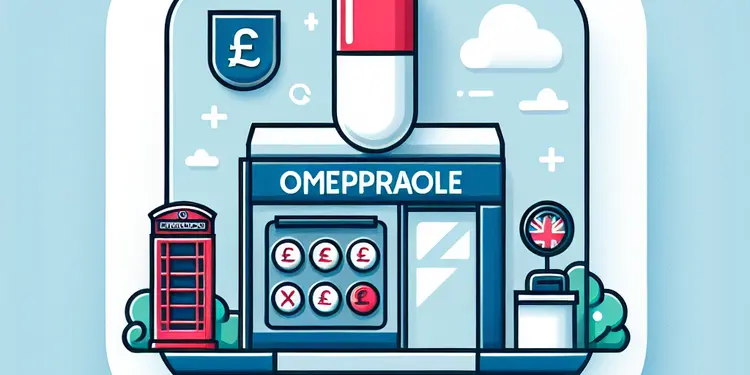
Find Help
More Items From Ergsy search
-

What is the drug Omeprazole?
Relevance: 100%
-

Is Omeprazole available over the counter?
Relevance: 97%
-

How should I take Omeprazole?
Relevance: 96%
-

How does Omeprazole work?
Relevance: 96%
-

What conditions is Omeprazole used to treat?
Relevance: 93%
-

What to do if you have heartburn or indigestion
Relevance: 14%
-

GP Nursing Most Common Medications UK.
Relevance: 8%
Introduction to Omeprazole
Omeprazole is a medication that belongs to a group of drugs known as proton pump inhibitors (PPIs). It is commonly used to treat conditions related to excess stomach acid, such as gastroesophageal reflux disease (GERD), stomach ulcers, and Zollinger-Ellison syndrome. In the UK, it is available both over-the-counter and by prescription, providing relief to many who suffer from heartburn and acid-related issues.
Mechanism of Action
Omeprazole works by inhibiting the proton pumps in the stomach lining, which are responsible for the secretion of gastric acid. The stomach produces acid to aid in the digestion of food and to eliminate harmful bacteria. However, overproduction of stomach acid can lead to discomfort and chronic conditions. Omeprazole targets these proton pumps, effectively reducing acid production and thereby alleviating symptoms associated with excess stomach acid. This action makes it particularly effective in healing acid-induced damage to the stomach and oesophagus lining, giving these tissues time to recover and regenerate.
Usage and Dosage
In the UK, Omeprazole is available in various forms, including capsules, tablets, and a liquid suspension. The typical dosage depends on the condition being treated and the individual's response to the medication. For over-the-counter use, it is often recommended for short-term relief, while prescription versions may be used for longer periods under medical supervision. It's important to follow the dosing instructions provided by a healthcare provider to ensure effectiveness and reduce the risk of side effects.
Benefits of Omeprazole
Omeprazole is praised for its ability to provide quick relief from heartburn and other acid-related symptoms. For those suffering from chronic conditions like GERD, it can significantly improve quality of life by reducing discomfort and preventing complications such as oesophageal ulcers and strictures. Additionally, by managing stomach acid levels, Omeprazole helps prevent damage to the stomach lining, lowering the risk of developing more serious gastrointestinal issues.
Possible Side Effects
While Omeprazole is generally well-tolerated, some people might experience side effects. Common side effects include headaches, nausea, vomiting, and diarrhoea. More serious side effects are rare but can include allergic reactions, kidney issues, or vitamin B12 deficiency with long-term use. It is essential to consult with a healthcare professional if any adverse effects occur or if symptoms persist despite treatment.
Conclusion
Omeprazole is an effective treatment for managing conditions associated with excess stomach acid. By understanding how it works and adhering to recommended dosages, individuals can greatly benefit from its use. As with all medications, it is important to use Omeprazole responsibly and under the guidance of a healthcare professional, ensuring it remains a beneficial part of managing digestive health in the UK.
Introduction to Omeprazole
Omeprazole is a medicine that helps with stomach problems. It can stop the extra acid in your stomach. People take it for heartburn, stomach ulcers, and other issues. You can buy it at the store, or a doctor can give you a prescription for it.
How Omeprazole Works
Omeprazole helps by stopping your stomach from making too much acid. This acid helps digest food, but sometimes there is too much of it, which can hurt your stomach. Omeprazole stops the acid pumps in the stomach, so it makes less acid. This helps your stomach heal and feel better.
How to Take Omeprazole
In the UK, Omeprazole comes as capsules, tablets, or liquid. How much you take depends on what your doctor says and how you feel. If you buy it over the counter, it is for short-term use. If a doctor gives it to you, you may take it longer. Always follow what the doctor or the instructions say to take it safely.
Benefits of Taking Omeprazole
Omeprazole helps people feel better when they have stomach problems. It stops heartburn and helps heal your stomach if there is damage. By making less acid, it protects your stomach from getting worse.
Possible Side Effects
Most people do not have problems, but some might feel unwell. You might get headaches, feel sick, or have diarrhoea. If you take it for a long time, it might cause more serious problems, but this is rare. Talk to your doctor if you feel something is wrong or if you do not get better.
Conclusion
Omeprazole is good for helping with extra stomach acid problems. Use it carefully, and follow what your doctor says. This way, Omeprazole can help keep your stomach healthy.
Frequently Asked Questions
What is omeprazole?
Omeprazole is a medication used to reduce stomach acid production and treat conditions like gastroesophageal reflux disease (GERD).
How does omeprazole reduce stomach acid?
Omeprazole works by blocking the proton pumps in the stomach lining, which are responsible for producing stomach acid.
Is omeprazole a proton pump inhibitor?
Yes, omeprazole is classified as a proton pump inhibitor (PPI).
What conditions does omeprazole treat?
Omeprazole is used to treat GERD, stomach ulcers, and conditions that cause excessive stomach acid like Zollinger-Ellison syndrome.
How long does omeprazole take to work?
Omeprazole typically begins to reduce stomach acid within an hour of taking it, but full effects may take 1-4 days.
Can omeprazole be taken long-term?
While generally safe for short-term use, long-term use of omeprazole should be monitored by a healthcare provider due to potential side effects.
What are common side effects of omeprazole?
Common side effects include headache, nausea, vomiting, diarrhea, and stomach pain.
Can omeprazole be used in children?
Omeprazole may be prescribed for children over age 1 with certain conditions, but it should be used under medical advice.
Does omeprazole interact with other medications?
Omeprazole can interact with certain medications, such as clopidogrel, some antifungal drugs, and HIV medications.
Is omeprazole available over-the-counter?
Yes, omeprazole is available over-the-counter for the treatment of frequent heartburn.
Can omeprazole cause vitamin deficiencies?
Long-term use of omeprazole can lead to vitamin B12 deficiency due to reduced stomach acid which is needed for B12 absorption.
Does food affect omeprazole effectiveness?
Omeprazole should be taken before meals for maximum effectiveness, as food can interfere with absorption.
Can you take antacids with omeprazole?
Yes, antacids may be taken with omeprazole if needed for immediate relief, though they should not be taken at the exact same time.
How does omeprazole compare to H2 blockers?
While both reduce stomach acid, omeprazole (a PPI) is often more effective and longer-lasting than H2 blockers like ranitidine.
What is the usual dosage for omeprazole?
The typical dose is 20 mg once daily, but this can vary based on the condition being treated and individual response.
Can omeprazole be taken during pregnancy?
Omeprazole should only be used during pregnancy if absolutely necessary and under a doctor's supervision.
What should I do if I miss a dose of omeprazole?
Take the missed dose as soon as you remember, unless it's almost time for the next dose. Do not double the dose.
How should omeprazole be stored?
Omeprazole should be stored at room temperature away from moisture and heat.
Is bleeding a side effect of omeprazole?
While uncommon, long-term use of omeprazole may increase the risk of gastrointestinal bleeding.
Can omeprazole be taken with alcohol?
There are no direct interactions, but alcohol can irritate the stomach and counteract omeprazole's effects.
What is omeprazole?
Omeprazole is a type of medicine. It helps your stomach feel better. Omeprazole stops too much acid in your belly.
Tools to help: Ask an adult to explain omeprazole. Use pictures to understand more.
Omeprazole is a medicine. It helps make less acid in your stomach. It is used for problems like acid reflux, which can cause heartburn.
How does omeprazole lower stomach acid?
Omeprazole is a medicine. It helps make less acid in the stomach. This helps if your tummy hurts because of too much acid. Omeprazole is like a shield. It stops the stomach from making so much acid.
If reading is hard, you can:
- Ask someone to read with you.
- Use a reading app that reads out loud.
- Break the sentences into smaller parts.
These can help you understand better.
Omeprazole helps your tummy feel better. It stops certain tiny parts called "proton pumps" in your stomach. These pumps make the acid that can cause a sore tummy.
Is omeprazole a proton pump inhibitor?
Yes, omeprazole is a proton pump inhibitor.
Here is what that means:
- Omeprazole is a type of medicine.
- This medicine helps reduce the amount of acid in the stomach.
- It can help with problems like heartburn.
Tips for understanding:
- Look at each part bit by bit.
- Ask someone to read it with you.
- Use a dictionary for hard words.
Yes, omeprazole is a type of medicine called a proton pump inhibitor, or PPI for short.
What problems does omeprazole help with?
Omeprazole can help if your tummy hurts.
It can help with things like:
- Tummy burning (heartburn)
- Ulcers in your tummy or gut
- Acid in your tummy coming up into your mouth (acid reflux)
Sometimes, people use tools like pictures or apps to help them understand. You can too!
Omeprazole is medicine. It helps with tummy problems. It is used for:
- Heartburn
- Stomach sores
- Too much acid in the tummy
Some people have too much tummy acid because of a condition called Zollinger-Ellison syndrome.
Omeprazole helps stop extra acid.
It is important to talk to a doctor before taking it.
How long does omeprazole take to help your tummy?
Omeprazole is a medicine for your tummy.
It can take a few days before it starts to help. You might feel better in 1 to 4 days.
If you need help taking your medicine, ask an adult or use a pill organizer.
Omeprazole helps with stomach acid. It starts to work in about one hour. It can take 1 to 4 days to work fully.
Can you take omeprazole for a long time?
Omeprazole is a medicine that helps your stomach. It's okay to use it for a short time if your doctor says so.
If you need to take it for a long time, ask your doctor. They can tell you if it's safe or if you need to try something else.
Using a calendar or setting a reminder can help you remember to take your medicine.
Omeprazole is usually safe to take for a short time. But if you take it for a long time, a doctor should check on you. This is because it might cause some problems.
What happens if I take omeprazole?
Sometimes, omeprazole can cause side effects. This means you might feel a little different after taking it.
Common Side Effects
- Feeling dizzy or getting a headache.
- Feeling sick in your tummy or having an upset stomach.
- Need to go to the toilet more often.
If you don’t feel well after taking omeprazole, tell a grown-up or a doctor. They can help you.
Tips to help you
- Take your medicine with water.
- Eat a snack after taking it if it upsets your tummy.
- Rest if you have a headache.
You might get a headache, feel sick in your tummy, throw up, have runny poo, or have a sore tummy.
Can Kids Take Omeprazole?
Yes, omeprazole can be used for kids. It helps with stomach problems. But, you should always talk to a doctor first.
Tips for Parents:
- Ask the doctor for advice.
- Read the medicine label carefully.
- Use a special spoon to measure the dose.
Omeprazole can be given to children over 1 year old if they have certain health problems. Always check with a doctor before using it.
Does omeprazole mix with other medicines?
Omeprazole is a medicine. It helps with stomach problems. Sometimes, medicines can change how other medicines work. Tell your doctor if you take any other pills.
- Make a list of all the medicines you take.
- Show this list to your doctor or nurse.
- Ask if it's okay to take omeprazole with them.
If it's hard to keep track, ask a friend or family member to help. You can also use a pill box with days of the week on it. This will help you remember when to take your medicines.
Omeprazole can mix badly with some medicines. These include clopidogrel, some medicines for fungus infections, and some HIV medicines.
Can you buy omeprazole without a prescription?
Yes, you can buy omeprazole from a shop or pharmacy without needing a doctor's note.
If you need help reading:
- Ask a friend or family member to read with you.
- Use a text-to-speech tool to listen to the words.
- Look for simple pictures that explain the information.
Yes, you can buy omeprazole in a store to help with heartburn that happens a lot.
Can taking omeprazole make you low on vitamins?
Taking omeprazole for a long time might cause you to have less vitamin B12 in your body. This happens because omeprazole makes your stomach have less acid, and acid helps your body take in vitamin B12.
If you are worried about not getting enough B12, you can ask a doctor or nurse for advice. They might suggest eating foods with B12, like meat, eggs, and dairy. There are also B12 vitamins you can take.
Does food change how well omeprazole works?
Some foods might change how omeprazole works in your body.
Here are some tips:
- Take omeprazole before you eat for it to work best.
- If you're not sure, ask a doctor or a pharmacist for help.
It is best to take Omeprazole before you eat. This helps the medicine work better. Food can make it harder for your body to absorb the medicine.
Can you take antacids with omeprazole?
People may wonder if they can take antacids with a medicine called omeprazole. Here is some easy information to understand:
- Omeprazole is a medicine that helps with heartburn and stomach problems.
- Antacids are medicines that help make your tummy feel better fast.
- You can use both omeprazole and antacids, but it's a good idea to ask your doctor or pharmacist first.
To help remember:
- Write down when you take your medicines.
- Use a pill organizer to keep track.
- Talk to a grown-up if you're not sure about your medicines.
You can take antacids with omeprazole if you need quick help. But do not take them at the same time.
What is the difference between omeprazole and H2 blockers?
Omeprazole and H2 blockers are both medicines.
They help when your stomach makes too much acid.
Omeprazole: This medicine stops your stomach from making too much acid.
H2 blockers: These also help reduce acid, but they work in a different way.
Both can help with heartburn and stomach ulcers.
It is important to ask your doctor which one is best for you.
Support tips: Use pictures or talk to someone if you need help understanding.
Both medicines help with stomach acid, but omeprazole works better and lasts longer than ranitidine.
How much omeprazole should I take?
Here is some simple advice to help understand medicine instructions:
- Ask a grown-up: Always check with an adult or doctor before taking medicine.
- Use a pill organizer: This can help you remember how much medicine to take.
- Read the label: The bottle or box will tell you how many pills to take.
- Set reminders: Use a clock or phone to remind you when to take your medicine.
If you are unsure, ask someone you trust to help you.
The usual amount to take is 20 mg once a day. But this can change depending on what is being treated and how the person reacts.
Can you take omeprazole when you are pregnant?
If you are pregnant and need to take medicine for your stomach, ask your doctor about omeprazole.
It is safe for most people, but your doctor will know what is best for you and your baby.
If you feel unsure or need help, you might use tools like a calendar to remember your medicine or ask someone to help you read about it.
Only take Omeprazole when you are pregnant if a doctor says it is really needed.
What do I do if I forget to take my omeprazole?
If you forget to take your omeprazole, don't worry. Take it as soon as you remember. But if it's almost time for your next dose, skip the missed one. Do not take two doses at the same time.
Here are some tips to help you remember:
- Set an alarm on your phone.
- Use a pill box with days of the week.
- Ask someone to remind you.
If you forget to take your medicine, take it when you remember. But, if it is almost time for the next one, just wait. Do not take two at the same time.
How to Store Omeprazole
Keep omeprazole in a cool, dry place. Do not put it in the bathroom or near the sink.
Make sure it is out of reach of children.
Keep it in its original container with the lid on tight.
If you need help, ask an adult or use a reminder app to remember where you store it.
Keep omeprazole pills at room temperature. Make sure they stay dry and away from heat.
Can taking omeprazole make you bleed?
Sometimes, medicine can cause bleeding. Omeprazole is a medicine for your stomach.
If you take omeprazole and notice bleeding, tell your doctor.
You could use a planner or ask a friend to help you remember to check for bleeding.
It's not very common, but taking omeprazole for a long time might make it more likely for your stomach or gut to bleed.
Can you take omeprazole with alcohol?
Omeprazole is medicine for your stomach. It helps with heartburn.
If you drink alcohol, it can upset your stomach.
So, it might be better not to drink alcohol when you take omeprazole.
If you're unsure, ask a trusted adult or your doctor. They can help you understand what is safe.
You can also use picture charts or apps to help you remember what to do.
Alcohol does not work directly with omeprazole, but it can upset your stomach and stop omeprazole from working well.
Useful Links
This website offers general information and is not a substitute for professional advice.
Always seek guidance from qualified professionals.
If you have any medical concerns or need urgent help, contact a healthcare professional or emergency services immediately.
Some of this content was generated with AI assistance. We’ve done our best to keep it accurate, helpful, and human-friendly.
- Ergsy carfully checks the information in the videos we provide here.
- Videos shown by Youtube after a video has completed, have NOT been reviewed by ERGSY.
- To view, click the arrow in centre of video.
- Most of the videos you find here will have subtitles and/or closed captions available.
- You may need to turn these on, and choose your preferred language.
- Go to the video you'd like to watch.
- If closed captions (CC) are available, settings will be visible on the bottom right of the video player.
- To turn on Captions, click settings .
- To turn off Captions, click settings again.
More Items From Ergsy search
-

What is the drug Omeprazole?
Relevance: 100%
-

Is Omeprazole available over the counter?
Relevance: 97%
-

How should I take Omeprazole?
Relevance: 96%
-

How does Omeprazole work?
Relevance: 96%
-

What conditions is Omeprazole used to treat?
Relevance: 93%
-

What to do if you have heartburn or indigestion
Relevance: 14%
-

GP Nursing Most Common Medications UK.
Relevance: 8%

